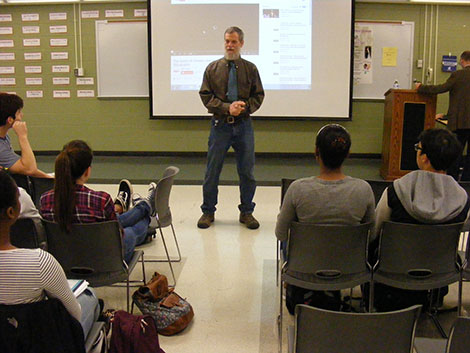Prosperity For Rhode Island
by Greg Gerritt
Prepared remarks for a Conference sponsored by the Rhode Island Socicety of Environmental Professionals held at the Rhode Island Resource Recovery Corporation’s facility in Johnston, Rhode Island.
Climate change is the existential crisis of our time. The removal of organics from our landfill stream is one of our key strategies for reducing the production of greenhouse gases, especially methane, and provides a new resource for one of the few industries in RI that is expanding, agriculture.
Like solar energy, compost is an idea whose time is finally coming. We could have adopted both technologies 30 years ago. But we waited for the damage to the planet to become overwhelming, and the price changes that accompany that part of our trajectory. Now we play catch up.
Even so, think of it as an opportunity. The opportunity to remake Rhode Island. I think there is fairly strong consensus in this room that the RI economy is stuck. I think where we might differ is on why it is stuck. It is my opinion that essentially for Rhode Island, and for most of urban New England, that economic growth, if it occurs at all, will never return to the growth rates we have become accustomed to or that our politicians want to promise. The changes in the economy mean that places like Rhode Island are going to see incomes trending towards a global mean that is considerably lower than incomes in RI now. We could treat this as a disaster and scream for tax cuts for the rich, or we could face the global and ecological challenges openly and honestly and decide to embark on a new path to prosperity in the 21st century. Compost, which exemplifies the life is round paradigm, is a big piece of the way forward.
The path to prosperity requires ecological healing and economic justice. I know the story about the business climate, but the evidence continues to show that business climates have negligible effects on economies, despite the hoopla. Politicians have been cutting taxes for the wealthiest for years and it has not worked out all that well. The example of the week is Kansas, which cut taxes, and now lags behind all of its neighbors in job creation. Missouri, which did not cut taxes, leads in job creation in that part of the Midwest. We have also heard the stories about how environmental regulations harm business, but when we practice Full Cost Accounting, communities always come out ahead when they protect the environment and public health.
Ecological healing as it relates to compost starts with keeping food scrap out of the landfill, which reduces methane emissions and the energy needed to place the food scrap there, as well as extending the life of the landfill. Compost also replaces fossil fuel based fertilizers in providing nutrients for plants, helps soil hold water, and can sequester more than a ton of carbon per acre on the farm.
Brownfields provide us with one of the best places to inject economic justice into our economy. What we do with brownfields is a big factor in the RI economy. Currently some of them are turned into parks and gardens, others into affordable housing, but often they become part of the gentrification that cities use to raise revenue (when they have not signed it all away with tax abatements). The results may be fine for some segments of the community but many other people are displaced, simply moving the poverty around the community like a shell game.
Brownfield communities are very similar to rainforest communities. Low income, marginalized, disempowered and disenfranchised. Like brownfield communities, rainforest communities are often made up of people considered to be a different ethnicity than those who dominate the politics of the area. And rainforest communities have insecure tenure as everyone who wants to get rich wants to steal the forest. The World Bank studied development in rainforest communities and figured out that if you wanted a good outcome, an outcome good for forest health and a serious reduction of poverty, there were a few key things to do. One was to make sure the poorest of the people received secure land tenure. The second component was that forest health had to be integral to the economic development. A third factor was that economic benefits had to be specifically targeted to the very poorest people, and often women. The flip side of this is that if the benefits of development were allowed to flow through traditional and power based channels, poverty increased as more and more resources were siphoned out of the community.
This tells us gentrification is likely to remove assets from the people already living in the area, and that the people living in the area prior to gentrification of a brownfield are likely to be poorer by some measures after than they were before. One final thing the World Bank says is important for success is that the people in the community have to democratically control the development and that the entire system has to be embedded in a system of economic democracy so that communities have a real voice and vote in what happens to them. This is as true in Olneyville as it is in Indonesia.
Compost gives us an opportunity. It is a resource generated everywhere that is needed everywhere. If we make sure the benefits: financial, soil building and food security, stay in the community, it is likely to build communities and help them thrive rather than displace them. And we all should remember that in the relatively near future much more of the RI economy is going to be food production. We will never completely feed ourselves with a million people in 1000 square miles, most of which are most productive as forests. But to do as well as we ought to, we need to grow food in low income urban neighborhoods using neighborhood generated compost.
In some ways the need to keep compost local fits the new compost law. It creates an opportunity for a dispersion of compost sites serving regional and local compost cycles and can be done using a variety of technologies.
I know something of the persistent effort to create an Anaerobic Digester in RI, but so far no one has succeeded. I have learned much by watching the unsuccessful efforts to put together deals. Over time I am less enamored of the AD technology; recognize that it produces relatively small amounts of gas.
The drought in California also reminds me to rethink Anaerobic Digestion. Between the low price of gas, and the great need for actual compost, I am not sure the AD industry is what is best for us, though I am guessing there are a few people who still are betting on it.
Compost by itself will not solve our problem, but when thinking about how to create a round society, a truly sustainable society, compost might be our best model. And that is what we need, a round society, one that wastes nothing, makes sure that the rewards are widely distributed, and leaves the ecosystems healthier than they were last year.
To finish up I want to return to California, which is now starting to mandate water restrictions and seeing millions of acres of agricultural land idled as the drought enters its 4th year and reservoirs are at record low levels along with the snow pack. This could be the biggest threat to food security in the US since the constitution was adopted, and not only Rhode Island will suffer.
The global economy has passed Rhode Island by despite the frantic but misguided efforts of the political and business classes over the last 50 years. The economy of the west will shrink as the planetary resources are needed to meet the real needs of the 2 billion hungry people around the world even as global resources are stretched ever thinner We need a new approach. A decentralized compost system, combined with greater efforts to improve food security by growing more food right here, is a better model for prosperity in our communities, than baseball stadiums paid for by the taxpayers, ever will be.
The founder of the think tank ProsperityForRI.com and the Coordinator of the Environment Council of Rhode Island’s Compost Initiative, Greg Gerritt has been involved in efforts to create a sustainable economy since the 1970’s when he began building solar buildings and creating organic homesteads. Currently involved in exploration/activism around the ecology/economy interface, urban agriculture, compost, river restoration, the Green Party of Rhode Island and the administration of the coalition of environmental organizations in RI, Gerritt has been the leading advocate in RI for making sure ecology is actually a component of efforts to create a sustainable economy in Rhode Island and in 2012 received a Merit Award from EPA Region 1 for advancing the cause of compost in Rhode Island.
 photo of Greg Gerritt addressing a High School Class by Boyd A. Loving
photo of Greg Gerritt addressing a High School Class by Boyd A. Loving
